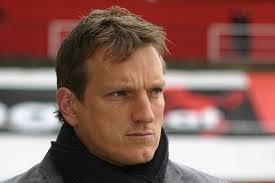By Paul Nicholson
February 17 – The US men’s national team may face the ‘group of death’ in Brazil at the World Cup finals – Germany, Portugal and Ghana are their opponents – but it is very much alive and kicking as preparations for the Finals start to take shape with one eye also firmly fixed on the future.
Last week Andi Herzog, the Austria-based assistant to head coach Jurgen Klinsmann, was in Munich to meet with Bayern junior star Julian Green. The 18 year-old who was born in Florida, has played youth football for the US and Germany. He made his Bayern and Champions League debut against CSKA Moscow last year.
It is the pulling through of sparkling young talent like Green from a variety of football backgrounds that Herzog believes will be the future for the success of the US national team.
Herzog is currently based in Europe and keeps a watching brief over the 17 or so American qualified players on the continent who could realistically make it into the World Cup squad. It will be talent like Green that he is seeking to encourage into the US set-up, if not for 2014 then certainly looking ahead to 2018.
The widening of this recruitment net for US-talent has very much been a part of the Klinsmann quiet revolution taking place in US soccer with its national team. It has brought together a different groups of players in both background and football experience.
In the past the US system generated its professional players predominantly through the college ranks with a Combine (players selected for trials) and a draft system. These players have made the bulk of the US team.
While the college system is still a central and important part of US soccer, the net has been spread much wider with the new academies across the US feeding in more players to the professional game than ever before.
“The US has had a totally different system because of the college influence,” says Herzog. “There are a lot of good players not in the draft system. We have been watching our players in the Mexican league and in Europe. We are also seeing good players starting to come out of the Academies that have not existed for that long.”
US World Cup preparations begin early with a training camp in Europe followed by a match in Ukraine in March. The team will re-group in April to play Mexico in the US before going into pre-Brazil training camp at Stanford University in California.
The European players will form the bulk of the team for the match against Ukraine. The north American-based players will be the core for the Mexico game. “It gives us a chance to assess all our players. We will take 30-35 players to the final training camp. Our advantage is that we will get a good four or five weeks of preparation with them before final selection and going to Brazil,” says Herzog.
In Brazil Herzog is confident that the US will be very competitive and has an opportunity to make it out of the group stages. “We believe we can make it to the knock-out rounds. Of course it is a tough group and every team will be tough and well prepared. Our first game against Ghana is a huge game for us,” says Herzog.
“On a really good day we can compete and win. We have some very skillful players like Michael Bradley and can win the midfield.” Herzog also singles out Clint Dempsey as an important player for the US.
But the process is not just about getting through to the 2014 knock-out stage. It is about building a new culture and approach and getting the best players properly educated in football and into the professional set-ups with the right coaching and playing in the right style – perhaps a different less physically dominating approach than the US has had in the past.
Herzog, an Austrian footballing legend who played over 100 times for his country, played for eight years in the Bundesliga plus a season at Bayern where he won a European Cup. He finished his career at the LA Galaxy in 2004 before taking a coaching role with the Austrian national U21 team. He is widely tipped to step up to a head coach job in the future – many believed he would get the Austrian job.
But the US is his priority and he is no stranger to the US game. “In 2004 when I joined the Galaxy everyone was very physical. The players were 100% fit and fast. Things have changed a lot in the last 10 years.”
‘The revolution will not be televised’ was a phrase coined by American musician Gil Scott-Heron in 1970, and picked up by Nike for an ad campaign in the mid-1990s. US Soccer is in the process of a gentle but hard-fought revolution that has a stronger chance than ever of upsetting football’s old-world order.
Contact the writer of this story at moc.l1734852046labto1734852046ofdlr1734852046owedi1734852046sni@n1734852046osloh1734852046cin.l1734852046uap1734852046

